
Wetenschap
Zuid-Korea lanceert eerste satelliet met raket van eigen bodem
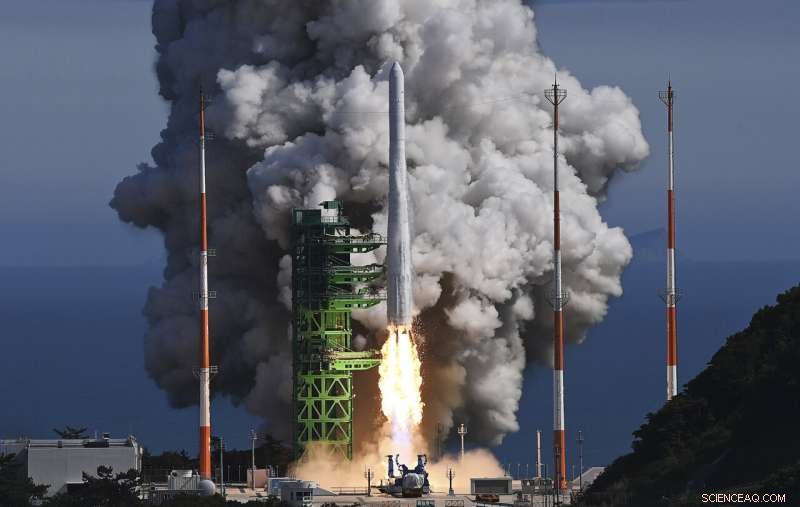
De Nuri-raket, de eerste in eigen land geproduceerde ruimteraket, stijgt op dinsdag 21 juni 2022 op vanaf een lanceerplatform in het Naro Space Center in Goheung, Zuid-Korea. Zuid-Korea lanceerde dinsdag zijn eerste in eigen land gebouwde ruimteraket in de tweede poging, maanden nadat de eerdere lancering er niet in slaagde een lading in een baan om de aarde te brengen. Krediet:Korea Pool/Yonhap via AP
Zuid-Korea voerde dinsdag zijn eerste succesvolle satellietlancering uit met behulp van een in eigen land ontwikkelde raket, zeiden functionarissen, waarmee het zijn groeiende ruimtevaartambities een boost gaf en aantoonde dat het over de belangrijkste technologieën beschikt die nodig zijn om spionagesatellieten te lanceren en grotere raketten te bouwen te midden van spanningen met rivaliserend Noord-Korea.
De drietraps Nuri-raket plaatste een functionerende "prestatieverificatie" -satelliet op een doelhoogte van 700 kilometer (435 mijl) na zijn 16:00 uur. lancering van het ruimtelanceringscentrum van Zuid-Korea op een zuidelijk eiland, zei het ministerie van Wetenschap.
De satelliet stuurde signalen over zijn status naar een onbemand Zuid-Koreaans station op Antarctica. Het vervoert vier kleinere satellieten die de komende dagen zullen worden vrijgegeven voor aardobservatie en andere missies, aldus functionarissen van het ministerie.
"De wetenschap en technologie van de Republiek Korea hebben grote vooruitgang geboekt", zei minister van Wetenschap Lee Jong-Ho tijdens een persconferentie op televisie in het lanceercentrum. "De regering zal haar gedurfde mars voortzetten om samen met het volk een ruimtemacht te worden."
In een videoconferentie met wetenschappers en anderen die bij de lancering betrokken waren, feliciteerde president Yoon Suk Yeol hen met hun prestatie en beloofde hij zijn campagnebelofte na te komen om een staatsluchtvaartagentschap op te richten, aldus zijn kantoor.
Live tv-video toonde de 47 meter lange raket die in de lucht opsteeg te midden van felle vlammen en dikke witte rook.

Mensen kijken naar de Nuri-raket, de eerste in eigen land geproduceerde ruimteraket, die op dinsdag 21 juni 2022 opstijgt vanaf het lanceerplatform nabij het Naro Space Center in Goheung, Zuid-Korea. Zuid-Korea lanceerde dinsdag zijn eerste in eigen land gebouwde ruimteraket in de de tweede poging van het land, maanden na de eerdere lancering, slaagde er niet in een lading in een baan om de aarde te brengen. Krediet:Chun Jung-in/Yonhap via AP
Door de lancering was Zuid-Korea het tiende land ter wereld dat een satelliet de ruimte in heeft gestuurd met zijn eigen technologie.
Het was de tweede lancering van een Nuri-raket in Zuid-Korea. Bij de eerste poging afgelopen oktober bereikte de dummy-lading van de raket de gewenste hoogte, maar kwam niet in een baan om de aarde omdat de motor van de derde trap van de raket eerder doorbrandde dan gepland.
Zuid-Korea, dat de 10e grootste economie ter wereld heeft, is een belangrijke producent van halfgeleiders, auto's en smartphones. Maar het programma voor ruimteontwikkeling blijft achter bij dat van de Aziatische buren China, India en Japan.
Noord-Korea heeft in 2012 en 2016 aardobservatiesatellieten in een baan om de aarde gebracht, hoewel er geen bewijs is dat een van beide ooit op afstand gebaseerde beelden en gegevens naar huis heeft verzonden. De Noord-Koreaanse lanceringen resulteerden in economische sancties van de VN omdat ze werden gezien als dekmantel voor het testen van de verboden langeafstandsrakettechnologie van het land.

Zuid-Koreaanse president Yoon Suk Yeol, midden, viert de succesvolle lancering van de Nuri-raket, de eerste in eigen land geproduceerde ruimteraket, op het presidentiële kantoor in Seoul, Zuid-Korea, dinsdag 21 juni 2022. Zuid-Korea lanceerde zijn eerste in eigen land gebouwde ruimte raket op dinsdag in de tweede poging van het land, maanden nadat de eerdere lancering er niet in slaagde een lading in een baan om de aarde te brengen. Krediet:Ahn Jung-won/Yonhap via AP
Sinds het begin van de jaren negentig heeft Zuid-Korea een hele reeks satellieten de ruimte in gestuurd, maar ze gebruikten allemaal buitenlandse rakettechnologie of lanceerplaatsen. In 2013 lanceerde Zuid-Korea voor het eerst met succes een satelliet vanaf de grond, maar de eerste trap van de raket was van Russische makelij.
Na die lancering van de satelliet beschuldigde het ministerie van Buitenlandse Zaken van Noord-Korea de Verenigde Staten van "dubbele standaarden en een brigand karakter", met het argument dat Washington de Zuid-Koreaanse lancering steunde, maar de VN-sancties leidde over de lancering van de Noord-satelliet van het voorgaande jaar. Noord-Korea heeft niet meteen gereageerd op de lancering van Nuri op dinsdag.
Zuid-Korea plant de komende jaren nog vier Nuri-lanceringen. Het hoopt ook een sonde naar de maan te sturen, ruimtelanceervoertuigen van de volgende generatie te bouwen en grootschalige satellieten in een baan om de aarde te sturen.
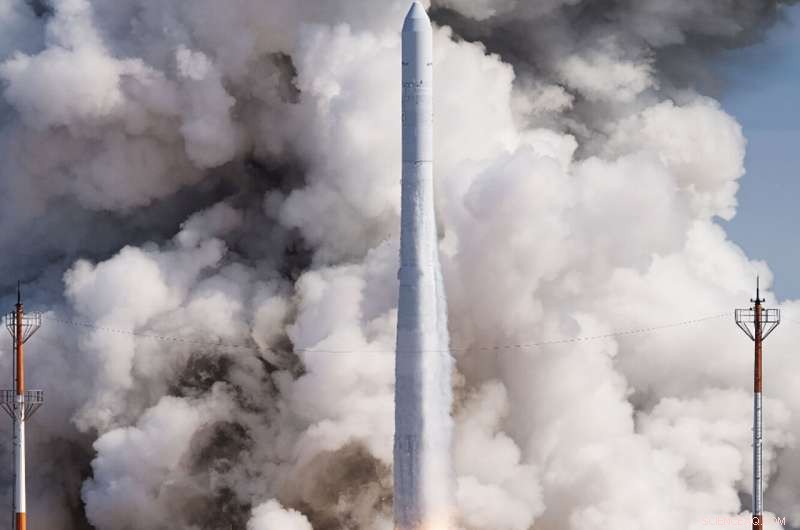
In this photo provided by Korea Aerospace Research Institute, the Nuri rocket, the first domestically produced space rocket, lifts off from a launch pad at the Naro Space Center in Goheung, South Korea, Tuesday, June 21, 2022. South Korea successfully launched its first homegrown space rocket on Tuesday, officials said, a triumph that boosted the country's growing space ambitions but also proved it has key technologies to build a space-based surveillance system and bigger missiles amid animosities with rival North Korea.Credit:Korea Aerospace Research Institute via AP
South Korean officials said the Nuri rocket has no military purposes.
The transfer of space launch technology is strictly restricted under a multilateral export control regime because it has military applications. Ballistic missiles and space launch vehicles often share similar bodies, engines and other components, though missiles require a reentry capability and other technologies.
"If you put a satellite on the top of a rocket, it would become a space launch vehicle. But if you mount a warhead on it, it becomes a weapon," said Kwon Yong Soo, a former professor at Korea National Defense University in South Korea. "(A successful launch) is really meaningful because we also succeed in the test of a long-range rocket that can be used to build a long-range missile."
Lee Choon Geun, an honorary research fellow at South Korea's Science and Technology Policy Institute, said it would be difficult to directly use Nuri as a missile because it employs liquid fuels that must be kept at extremely low temperatures and requires much longer fueling time than solid fuels. He said North Korean long-range missiles also use liquid fuels, but extremely toxic ones that are maintained at ordinary temperatures and require less fueling time than Nuri.
-
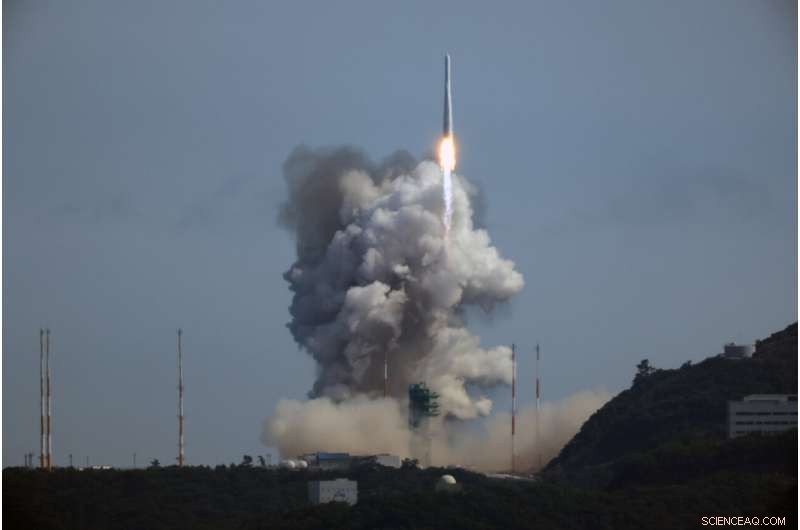
The Nuri rocket, the first domestically built space rocket, lifts off from a launch pad at the Naro Space Center in Goheung, South Korea, Tuesday, June 21, 2022. South Korea launched its first domestically built space rocket on Tuesday in the country's second attempt, months after its earlier liftoff failed to place a payload into orbit. Credit:Kim In-chul/Yonhap via AP
-
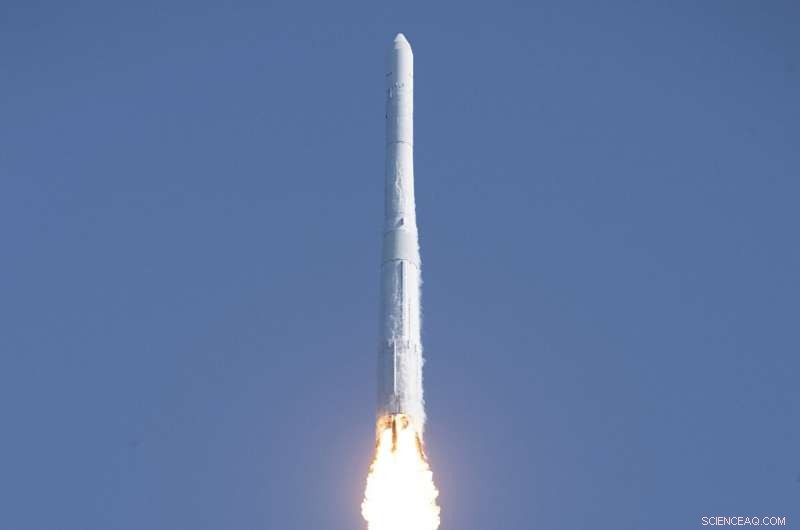
In this photo provided by Korea Aerospace Research Institute, the Nuri rocket, the first domestically produced space rocket, lifts off from the Naro Space Center in Goheung, South Korea, Tuesday, June 21, 2022. South Korea successfully launched its first homegrown space rocket on Tuesday, officials said, a triumph that boosted the country's growing space ambitions but also proved it has key technologies to build a space-based surveillance system and bigger missiles amid animosities with rival North Korea.Credit:Korea Aerospace Research Institute via AP
-
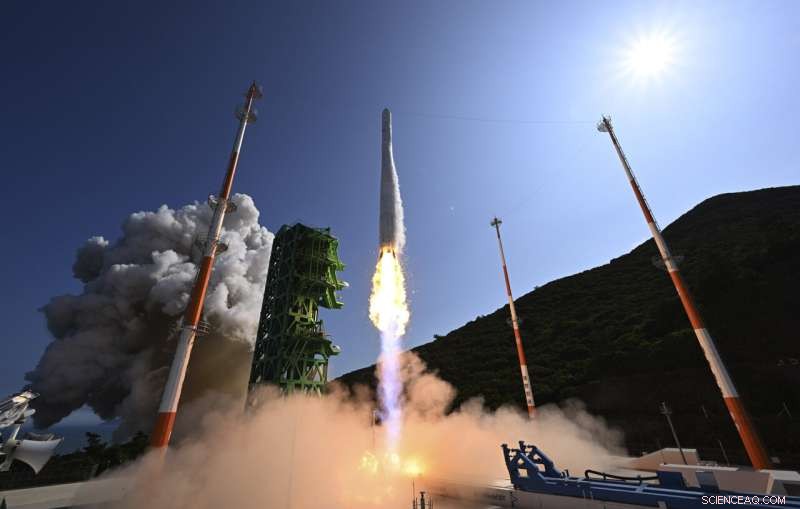
The Nuri rocket, the first domestically produced space rocket, lifts off from a launch pad at the Naro Space Center in Goheung, South Korea, Tuesday, June 21, 2022. South Korea successfully launched its first homegrown space rocket on Tuesday, officials said, a triumph that boosted the country's growing space ambitions but also proved it has key technologies to build a space-based surveillance system and bigger missiles amid animosities with rival North Korea. Credit:Korea Pool/Yonhap via AP
-
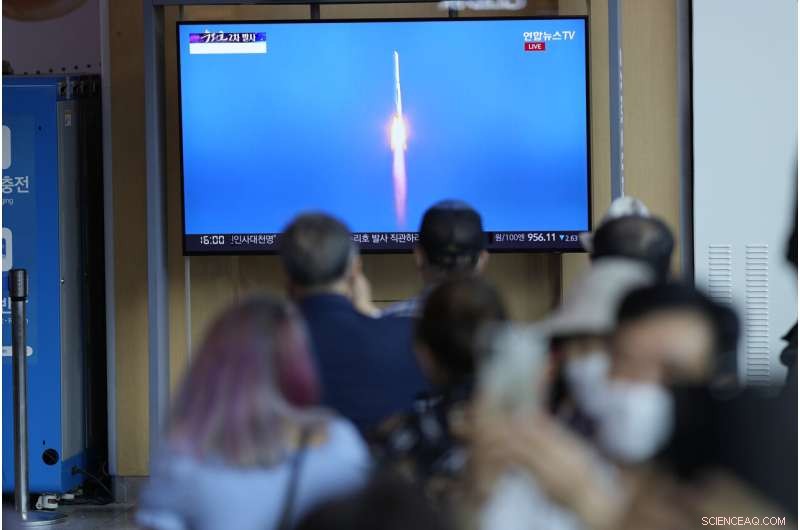
People watch a TV screen showing a live news program at a train station in Seoul, South Korea, Tuesday, June 21, 2022. South Korea launched its first domestically built space rocket on Tuesday in the country's second attempt, months after its earlier liftoff failed to place a payload into orbit. Credit:AP Photo/Lee Jin-man
-
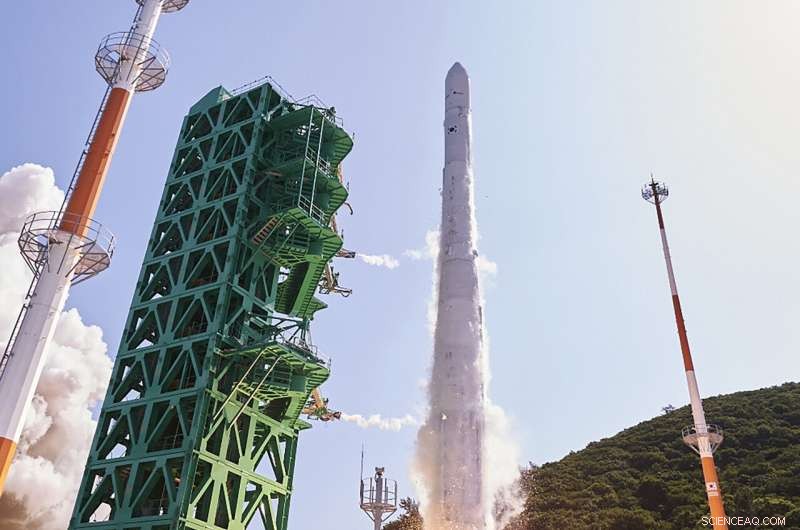
In this photo provided by Korea Aerospace Research Institute, the Nuri rocket, the first domestically produced space rocket, lifts off from a launch pad at the Naro Space Center in Goheung, South Korea, Tuesday, June 21, 2022. South Korea successfully launched its first homegrown space rocket on Tuesday, officials said, a triumph that boosted the country's growing space ambitions but also proved it has key technologies to build a space-based surveillance system and bigger missiles amid animosities with rival North Korea.Credit:Korea Aerospace Research Institute via AP
-
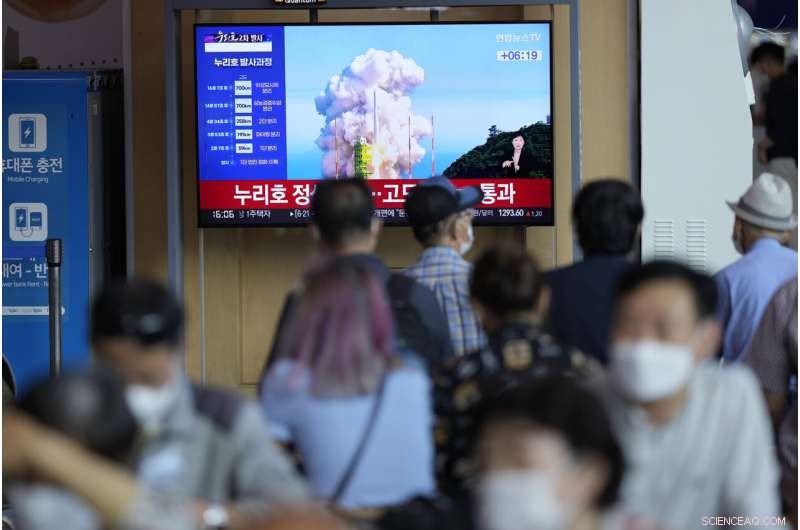
People watch a TV screen showing a news program about the country's rocket launch at a train station in Seoul, South Korea, Tuesday, June 21, 2022. South Korea launched its first domestically built space rocket on Tuesday in the country's second attempt, months after its earlier liftoff failed to place a payload into orbit. Credit:AP Photo/Lee Jin-man
-
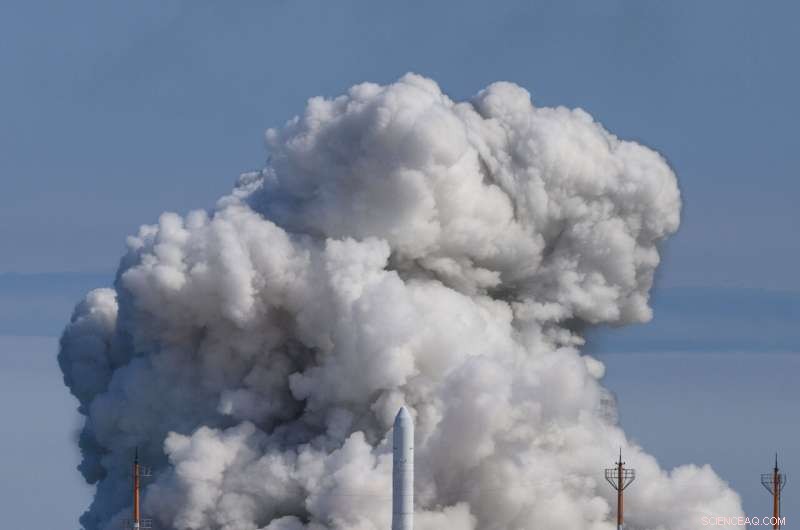
The Nuri rocket, the first domestically produced space rocket, lifts off from a launch pad at the Naro Space Center in Goheung, South Korea, Tuesday, June 21, 2022. South Korea launched its first domestically built space rocket on Tuesday in the country's second attempt, months after its earlier liftoff failed to place a payload into orbit. Credit:Korea Pool/Yonhap via AP
This year, North Korea has test-launched about 30 missiles with ranges that potentially place the U.S. mainland and regional allies South Korea and Japan within striking distance.
South Korea already has missiles that can hit all of North Korea, but some experts say it also needs longer-range missiles because it's surrounded by regional military powers and potential adversaries.
"If we only think about North Korea, a long-range missile doesn't mean much for us. But it's very unfortunate that military powers like China and Russia are near us," Kwon said.
He said Nuri's successful launch proves South Korea has the capability to send a spy satellite into orbit. Lee said Nuri can be used to launch a spy satellite, but it would be better for South Korea to have many small spy satellites that could be sent up with less powerful solid-fueled rockets.
South Korea currently has no military reconnaissance satellites of its own and depends on U.S. spy satellites to monitor strategic facilities in North Korea. South Korea has said it plans to launch its own surveillance satellites soon. + Verder verkennen
S. Korea conducts successful rocket engine test
© 2022 The Associated Press. Alle rechten voorbehouden. Dit materiaal mag niet worden gepubliceerd, uitgezonden, herschreven of opnieuw verspreid zonder toestemming.
 De leegte in de ammoniaksynthese vullen:de rol van stikstofvacatures in katalysatoren
De leegte in de ammoniaksynthese vullen:de rol van stikstofvacatures in katalysatoren Van kristallen tot glazen:een nieuwe uniforme theorie voor warmtetransport
Van kristallen tot glazen:een nieuwe uniforme theorie voor warmtetransport Waarom scheren zelfs de scherpste scheermessen dof maakt
Waarom scheren zelfs de scherpste scheermessen dof maakt Verbeterde afvalscheiding door superstabiele magnetische vloeistof
Verbeterde afvalscheiding door superstabiele magnetische vloeistof Wat is een polaire molecule?
Wat is een polaire molecule?
 Is Syrië echt een klimaatoorlog? De verbanden tussen droogte, migratie en conflict
Is Syrië echt een klimaatoorlog? De verbanden tussen droogte, migratie en conflict Nieuw klimaatmodel helpt onderzoekers waterbehoefte beter te voorspellen
Nieuw klimaatmodel helpt onderzoekers waterbehoefte beter te voorspellen Extreme overstromingen treffen Amerikaanse steden bijna dagelijks tegen 2100
Extreme overstromingen treffen Amerikaanse steden bijna dagelijks tegen 2100 Stadslandbouw kan helpen, maar niet oplossen voedselveiligheidsproblemen in de stad
Stadslandbouw kan helpen, maar niet oplossen voedselveiligheidsproblemen in de stad Stedelijk land en aerosols versterken gevaarlijk weer, stuur stormen richting steden
Stedelijk land en aerosols versterken gevaarlijk weer, stuur stormen richting steden
Hoofdlijnen
- Vrouwelijke wetenschappers die de wereld veranderden
- Lichtgroene planten besparen stikstof zonder in te boeten aan fotosynthetische efficiëntie
- Doorbreken van peulvruchten gewas wilde relatieve barrière
- Celkarakteristieken
- Manukahoning kan helpen om dodelijke medicijnresistente longinfectie te genezen, suggereert onderzoek
- Louis Pasteur: Biografie, uitvindingen, experimenten en feiten
- Evolutionaire relaties tussen prokaryoten en eukaryoten
- Nieuwe sorghumcultivars kunnen duizenden liters ethanol produceren
- Vereiste chemische reacties om homeostase te handhaven
 Astronomen volgen de nabijgelegen blazar Markarian 501
Astronomen volgen de nabijgelegen blazar Markarian 501 Waarom kunnen we de voetstappen van anderen horen,
Waarom kunnen we de voetstappen van anderen horen,  Het gebruik van Facebook als aanvulling op neurowetenschappelijke studies verhoogt de cijfers van studenten
Het gebruik van Facebook als aanvulling op neurowetenschappelijke studies verhoogt de cijfers van studenten Wat is de oorsprong van diesel?
Wat is de oorsprong van diesel?  Ontwerp en validatie van een meerlaagse thermische emitter van wereldklasse met behulp van machine learning
Ontwerp en validatie van een meerlaagse thermische emitter van wereldklasse met behulp van machine learning Britse autosector waarschuwt voor £ 70 miljoen dagelijkse kosten op Brexit no-deal
Britse autosector waarschuwt voor £ 70 miljoen dagelijkse kosten op Brexit no-deal Vanuit de ruimte en in de lucht, NASA volgt bosbranden in Californië
Vanuit de ruimte en in de lucht, NASA volgt bosbranden in Californië Extreme regenval is over de hele wereld met elkaar verbonden
Extreme regenval is over de hele wereld met elkaar verbonden
- Elektronica
- Biologie
- Zonsverduistering
- Wiskunde
- French | Italian | Spanish | Portuguese | Swedish | German | Dutch | Danish | Norway |

-
Wetenschap © https://nl.scienceaq.com






